|
Damn near the moment we’ve all been waiting for. I finally have pigs foraging in the woods. I’ve wanted to do this for years. Wild pigs don’t live on the prairie. They live in the woods, rooting for tree mast, grubs, and whatever else they can find. I think livestock should be raised as close to their natural environment as possible and have access to their natural foods. How can I hold that conviction if I don’t test it first hand?
I’ve been asking myself for a long time, “why wouldn’t anyone who really wants to raise premium pork do this?” I’m sure I’ll have a detailed answer in time, but the short answer is labor. Normally, I can fence in several acres with two strands of electric wire in one long day. I spent days laying out 1,500 yards of fence lines in the woods, adjusting, adjusting, and adjusting again to get the straightest lines (taught wires don’t like curves) without felling any good trees. I burned seven tanks of gas in my chainsaw cutting Buckthorn, Boxelder, and plenty of fallen logs—including a 78' Bur Oak—in my path. I hand carried all of my materials out there: steel T-posts and round posts, buckets of insulators, and a couple 44 lb spools of electric fence wire. I carried all my tools out at 2:00 this afternoon. When I let the hogs into the pasture section that connects to the woods, they worked their way through the pasture and stopped in a line where the electric fence used to be (they were in this same pasture back in July). One of the Tams (never fails) stepped forward into the brush, then her sister, then the whole line. I followed them later as they worked their way deeper into the woods, under the Bur Oaks, and heard a different oinking tone. Normally, when I walk through the group, there’s a satisfied/curious oink-oink-oink-oink, grunt-grunt as they approach me. (It’s a little bit like the Sesame Street Martians—yip-yip-yip-yip-yip—uh-huh, uh-huh). When the hogs are out of feed, they have a lower, more menacing tone. But when I caught up to them under the oaks, they ignored me. Instead they oinked back and forth to each other in louder, higher tones—like they were calling out their finds, “Damn, these are good.” They snuffled under the leaf litter for acorns and hickory nuts and rolled rotten logs for grubs. Definitely a kids-loose-in-a-candy-store moment. I went out after dark to check on them. Both shelters in the pasture were empty. I walked the fence path into the trees until I could hear snoring and shined my light on a pile of bristly black forms. They’ve never slept under a tree in their lives and now they are bedding down in the woods like their wild counterparts. I’ll have to manage their foraging so they don’t tear up the candy store, but it’s worth seeing this unfold. Admittedly, pork on the plate is the real moment we’re waiting for, and the final test, but I think that better feed and environment leads to a better product. We’re getting there. I poured myself a celebratory Manhattan when I came back in. Damn, these are good.
0 Comments
Sometimes the gap between what I think I’m going to accomplish and what I can actually accomplish gets too wide to span.
The military euphemism for someone overwhelmed with more than they can effectively handle is Overcome By Events. I often heard it as a slight from more senior officers about junior officers: “Yeah, he was OBE,” the field grades would say with that knowing, wolfish grin. OBE is exactly what you want to do to your enemy—to throw so much at him that he can’t react to all of it, leaving himself vulnerable somewhere. But OBE happens without an opponent. I don’t have any opponents here—just life’s circumstance: Hazel fell and broke her arm last month. There went that Friday. The fuel pump went out in Sarah’s car the next week. The water pump started going out on the RAV the week after that. (I accept these larger repairs since we drive vehicles with well over 100,000 miles on them, but I’d prefer the breakdowns with a little more space in between them). It’s been raining all summer and now fall, so I’m moving pigs more than I had planned so I can keep them out of the mud. Rain has set me back more times than I can count. A seventy-eight foot tall Bur Oak fell across my planned fence path in the woods. Other standing oaks prevent me from going around it easily so I’ve been chainsawing for the past two days. Unhandy. It’s ok for a plan to OBE—circumstance sometimes outpace plans. You just don’t want to be OBE yourself. To avoid mental OBE at these times, I drop into a “critical functions” work mode. I think of it as only two parts, but there’s an attitude that you need to have even to start, so let’s make it three parts. Step one: Accept that these things happen. I can’t control the weather or a lot of other circumstances. I’m not OBE, my plans are. Stercus Accidit, the ancient Romans said. Step two: Decide what you can blow off for a while. Here’s just the top of my list: Putting unused tools and small engines on Craigslist, organizing the tool room in the barn, digging potatoes (because it’s more like “potato mining” when it’s this wet), fixing a couple sliding stall doors, storing the tomato towers, and a whole collection of non-critical small repairs. There’s a nice little weight off the shoulders when we realize that a lot of what we think we “have” to do is actually elective. I like my work world to be neat and organized. I’m more efficient and happier that way, but I can’t get to all of that right now. I just temporarily lowered my expectations instead. Ah, that’s better. Step three: Focus on the high-payoff tasks. We still need to eat and the kids still need to get to school. Beyond that, the rest of my work for the next two months comes down to feeding and selling hogs. Once they find homes in freezers across Southern Wisconsin, I can take a break and get back to organizing things around here. Something else will come up along the way. It always does. I’ll deal with whatever pops up. Plans will changes, but I won’t be OBE. “Dad, why don’t we eat cereal from a box like other people?” Karsten asked a few mornings ago while eating yogurt, fruit, and a homemade muffin. Our kids are starting to figure out that our “normal” isn’t exactly the norm.
“Most cereals are empty calories,” I explained. “They fill you up at breakfast, but won’t give you energy for long.” My brother and I ate cereal as kids, but as teenagers working on the farm, we quickly learned that we’d have to eat ten bowls of Total at 5:30 in the morning if we didn’t want to be starving by 9 am. That reality hasn’t changed for me though ten years in the Marine Corps, ultra-running, and working on my own farm. “Cereal companies also pay farmers very little for the grain compared to what they charge us to buy cereal,” Sarah chimed in. We didn’t go into the math for the kids, but here’s an example: Organic, food-grade yellow corn is around $10 a bushel (56 lbs). With a little bit of grinding, cooking, packaging, and shipping, food companies sell you a 10.6-ounce box of cereal for $5.00. (I looked up cereal prices just to be sure. 10.6 ounces? When did boxes get so small?) That’s an increase of more than 4,000%. A food ingredient buyer for Ralston-Purina (they produced breakfast cereals such as the “Chex” line) told my dad decades ago, “If farmers knew how easy it is to make cereal, they’d revolt.” I’ve never seen my dad eat cold cereal. Ever. How we eat isn’t just a nutritional choice, it’s our economic vote. Right—a vote—a choice with a bit of influence. What has more influence, the votes we cast every two or four years, or the dollars we spend—or choose not to spend—almost daily? The biggest corporations have at least as much influence on our lives as politicians: corporations decide what to charge for phone and internet service, and where those services work; corporations determine the differential between what they pay employees versus what they charge you for services; if they are large enough, corporations set the market for raw materials versus what they charge for products, such as food. The biggest corporations also wield significant political muscle. Just research the political influence of Monsanto or Koch Industries. If only half of the information written about those companies’ political influence is true, they might carry more power than a swing state. I don’t think that all corporations are bad, but I consider my economic decisions because they likely have more impact than a single vote over the long term. Several years ago, in a sidebar conversation about farm politics at a Farmer Veteran Coalition event, a representative from the USDA in Washington D.C., chided me when I said I was a political independent. “You’ve got to pick a team,” she scoffed, “or your voice will never be heard.” I won’t “pick a team.” Politics isn’t the NFL (though it seems to have gone that way—lots of hype and senseless loyalty). No political party, special interest group, or national organization fully represents my thinking or supports my interests and beliefs. I can’t think of a current party or candidate that I would support without serious misgivings. My economic votes are more straight forward. I usually buy used tools and machines, I try to limit my fuel consumption, and support local business when it’s an option. How I spend my money won’t break the food giants or turn around a small business, but like our collective political votes, our cumulative decisions make a difference. This morning, we ate homemade rye bread and eggs. I made the bread and Hazel gathered the eggs yesterday afternoon. A satisfying meal all around. I’ll cast a few more economic votes today and some tomorrow. The money I spend is my choice and my voice. [In case you’re wondering how I’m leaning for November, I’m still undecided between Berkshire and Tamworth.] I just picked up two tons of feed which will take the pigs up to market weight.* After confusing and then impressing the feed mill’s forklift operator by putting ten bags in the cab to balance the weight between axles (“I guess you know your truck,” he said, shaking his head with a smile), I strapped the next pallet to the trailer and hit the road.
Today’s farm workout: human forklift. Re-stack 1,000 lbs of bagged feed to make room in the feed room. Then carry and stack 4,000 lbs of feed (carry two bags at a time—half the trips). I unloaded the truck and trailer in an hour and refueled with two sloppy joes and an undisclosed number of homemade cookies. Not a bad morning. "Why not use bulk feed," the forklift guy asked. Bulk feed is easier if you do all your work with a tractor, but bags give me a certain flexibility. At this scale, I can carry two bags several hundred yards to the feeder more easily than I could get it out there with a tractor and wagon (If I even had a tractor) going through gates or with four buckets on the back of a 4-wheeler. For now, keeping it simple keeps me fit. I'm not finished. I need to pick up a trailer load of firewood that I cut along the lane last week-- *It’s a Non-GMO batch, which I’ll mix with the ton of organic feed I have remaining. Next month, when my open-pollinated corn is ripe, I’ll incorporate some of that into their feed as well. |
Ryan Erisman
Former Marine Infantry Officer. Iraq Vet. Interested in Regenerative Agriculture at any scale. Archives
February 2023
Categories |
Odyssey Farm, LLC.
The Odyssey Farm Journal
Odyssey Farm, LLC
|
Dane County Climate Champion
|
608.616.9786
|
Copyright © 2016
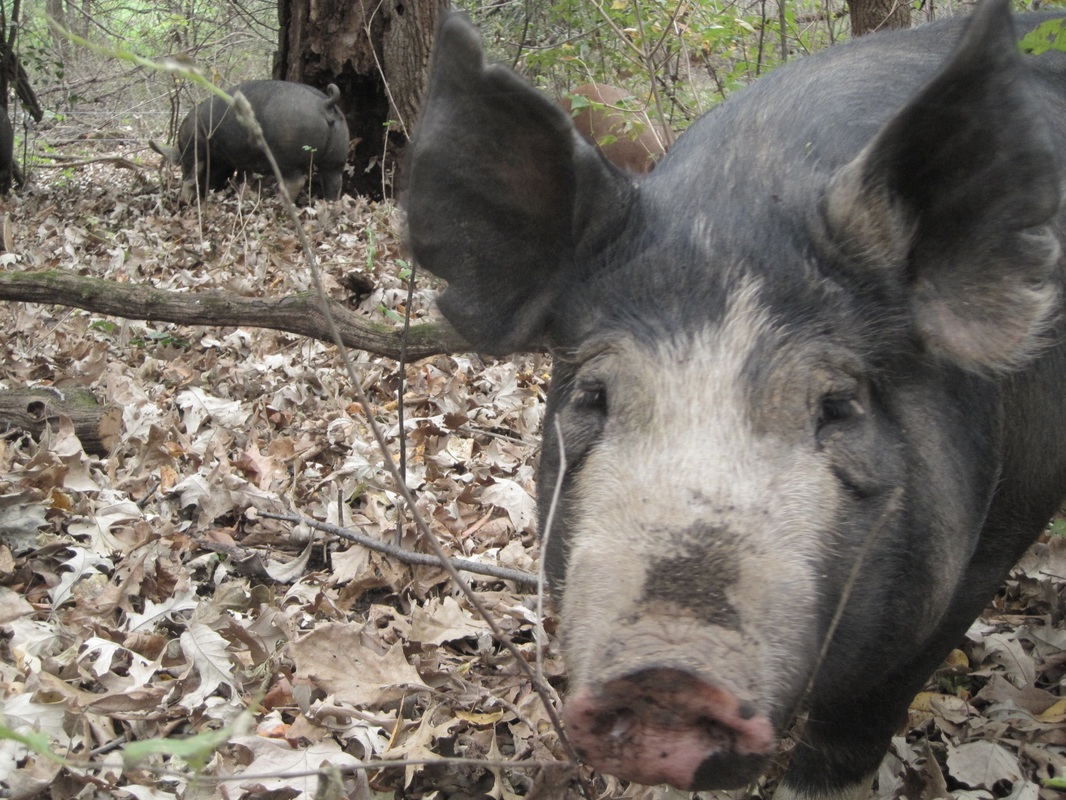
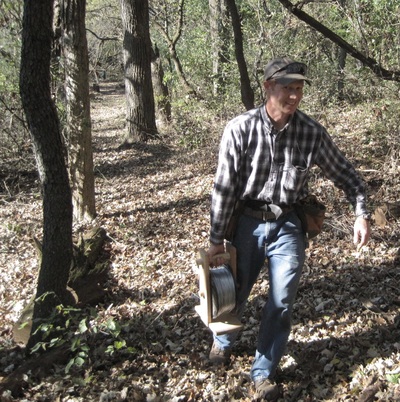
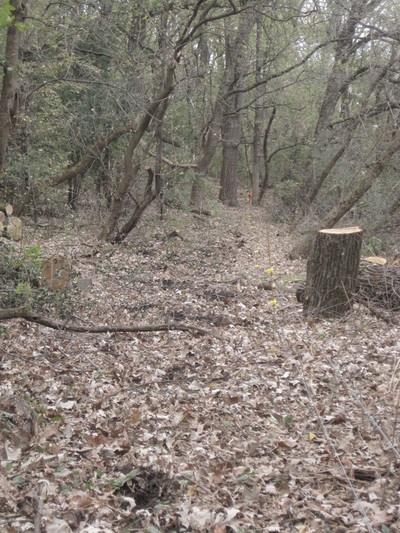
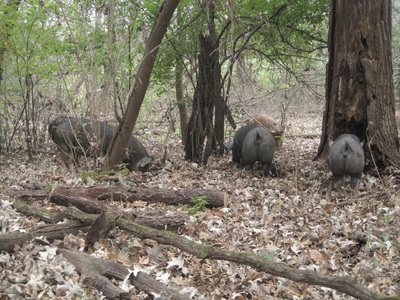
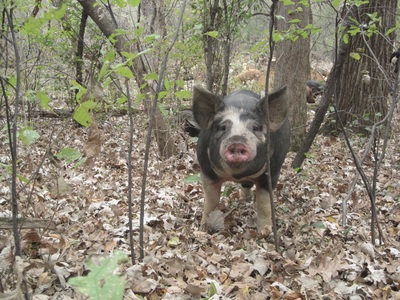
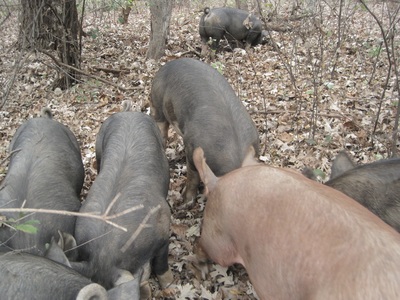

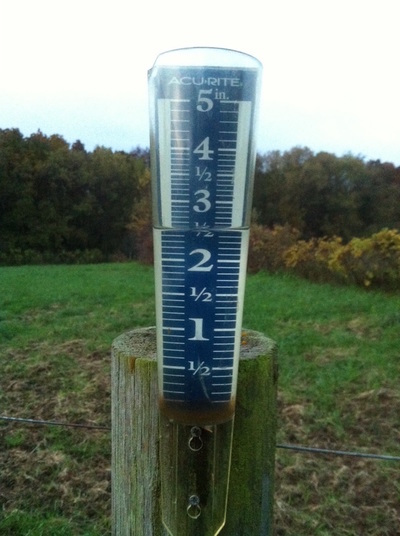
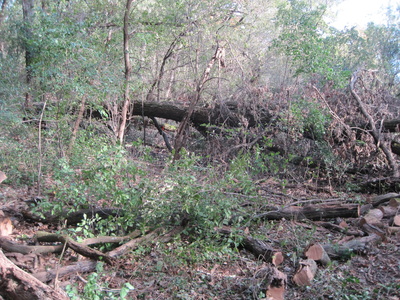
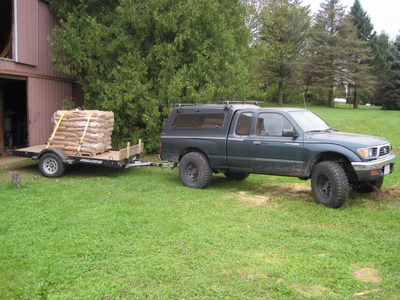
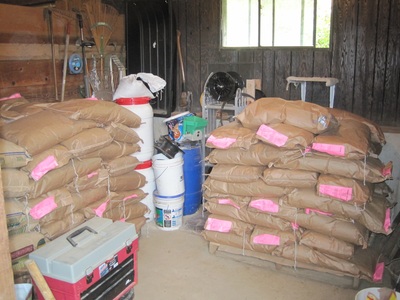
 RSS Feed
RSS Feed